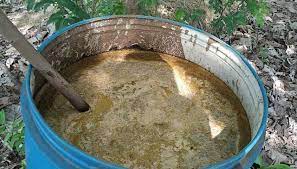In the world of organic farming and sustainable agriculture, Jeevamrutham has gained recognition as a powerful natural fertilizer. This nutrient-rich concoction has been hailed as a game-changer for those seeking to enhance the vitality of their crops and soil. In this comprehensive guide, we will delve into the depths of Jeevamrutham, exploring its composition, benefits, and how to create this elixir of life for your plants.
1. Introduction
Jeevamrutham, often referred to as “life-giving nectar,” is a natural fertilizer and soil conditioner that has gained immense popularity among farmers and gardeners. This organic elixir is celebrated for its ability to rejuvenate soil, enhance plant growth, and promote sustainable agriculture.
2. What is Jeevamrutham?
Jeevamrutham is a traditional Indian agricultural practice that involves fermenting a mixture of organic materials to create a nutrient-rich liquid. This concoction serves as a powerful fertilizer, teeming with beneficial microorganisms, essential nutrients, and enzymes. Get the best quality of Jeevamrutham online from Sampurna Arogyam.
3. The Origins of Jeevamrutham
The origins of Jeevamrutham can be traced back to ancient Indian farming practices, where the harmonious relationship between nature and agriculture was highly revered. Farmers recognized the importance of nourishing the soil to ensure bountiful harvests.
4. The Key Nutrients in Jeevamrutham
4.1. Macronutrients
Jeevamrutham is packed with macronutrients such as nitrogen (N), phosphorus (P), and potassium (K), which are essential for plant growth. These nutrients are present in a form that is readily accessible to plants, promoting robust development.
4.2. Micronutrients
In addition to macronutrients, Jeevamrutham contains a plethora of micronutrients like iron, zinc, copper, and manganese. These trace elements are crucial for various biochemical processes within plants, ensuring their overall health.
5. The Benefits of Using Jeevamrutham
5.1. Enhanced Soil Fertility
Jeevamrutham enriches the soil with organic matter, improving its structure and water-holding capacity. This, in turn, enhances soil fertility, making it more conducive to plant growth.
5.2. Improved Plant Growth
Plants treated with Jeevamrutham exhibit increased root development, healthier foliage, and a higher yield of fruits and vegetables. The natural growth-promoting substances in Jeevamrutham stimulate plant growth in a sustainable manner.
5.3. Pest and Disease Resistance
The beneficial microorganisms in Jeevamrutham create a protective shield around plants, making them more resilient to pests and diseases.
6. How to Make Jeevamrutham
6.1. Ingredients
To make Jeevamrutham, you will need the following ingredients:
- Cow dung
- Cow urine
- Jaggery
- Water
- Soil
6.2. Preparation Steps
- Mix one kilogram of cow dung and 10 liters of water in a container.
- Allow the mixture to ferment for 3-4 days.
- Dilute cow urine in water (1:10 ratio) and add it to the fermenting mixture.
- Add jaggery to the container and stir well.
- Cover the container and let it ferment for another 2-3 days.
- Your Jeevamrutham is ready when it has a sweet-sour smell and is rich in beneficial microorganisms.
7. Application of Jeevamrutham
Jeevamrutham can be applied to the soil and plants in various ways, including foliar spray, root drenching, and seed treatment. The method of application depends on your specific gardening or farming needs.
8. Jeevamrutham vs. Chemical Fertilizers
Compared to chemical fertilizers, Jeevamrutham is a sustainable and environmentally friendly alternative. It does not harm the soil or water bodies and promotes long-term soil health.
9. Tips for Successful Jeevamrutham Application
- Test your soil to determine the optimal application rate.
- Apply Jeevamrutham during the cooler parts of the day to prevent evaporation.
- Maintain proper aeration in the soil for the microorganisms to thrive.
- Use high-quality ingredients to ensure the effectiveness of Jeevamrutham.
10. Frequently Asked Questions (FAQs)
10.1. What crops benefit most from Jeevamrutham?
Jeevamrutham benefits a wide range of crops, including vegetables, fruits, cereals, and legumes. It can be used for both field crops and garden plants.
10.2. Is Jeevamrutham safe for organic farming?
Yes, Jeevamrutham is an organic and natural fertilizer, making it safe for organic farming practices.
10.3. How often should I apply Jeevamrutham?
The frequency of application depends on your specific crop and soil conditions. As a general guideline, applying


